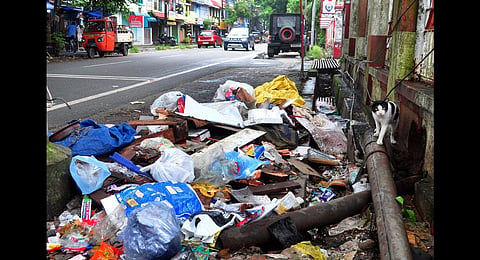

KOCHI: This is not how Kochi used to be, says Krishnakumar, who runs a tea shop near LuLu Mall in Edapally. “Big buildings have cropped up, that’s a good thing. But what about the big heaps of waste?” he asks.
The 55-year-old steps out of his warm shop, and continues: “Roadsides, canals, private plots... they all have turned into dumping yards. The local bodies refuse to take action, and the heap of waste lies as it is for weeks, months and years.”
How do we clear this mess?
It would be ironic to look at the measures taken by various bodies other than the corporation to keep Kochi clean. One example is a recent initiative of a trade and industry body to reward corporation councillors who ensure their respective wards are maintained clean.
“A reward for doing one’s basic duty?” asks one of the retired men, in their late 60s, who gather near the Stadium Link Road for evening walks. “Leave that, let’s hope at least incentives such as this would motivate the councillors,” says another.
A leading architect and Better Kochi Response Group president S Gopakumar calls for more waste bins or collection points across the city. “A few years ago, the corporation declared Kochi as a ‘no bin city’. One of the issues cited back then was people filling up the dustbins with household waste,” he says.
“However, door-to-door waste collection is being done in most places. So, it’s time that waste bins make a comeback on the streets and tourist places in the city. The local body must also ensure its maintenance.”
K J Mathew, president of the Cherupushpam Nagar Residents’ Welfare Association in Kadavanthara, agrees that waste collection is being carried out more promptly than before. But one has to pay for it, the former CMFRI scientist points out.
Radha S, a 65-year-old widow staying in the area, says the monthly fee of Rs 200-300 is agreeable. “But there are times when we do some garden pruning, or have some excess waste to clear. For one sack, they demand Rs 1,500,” she adds. “I don’t have any source of income. How do I shell out such a huge amount? Can you see that sack? It’s been lying there for a few weeks now.”
Former bureaucrat and political leader P C Cyriac stresses waste management is a fundamental duty of the local body, according to the Municipal Act. “If we speak legally, they should not be charging people for it, as we pay taxes to the corporation,” he notes.
“Currently, Kudumbashree and Haritha Karama Sena members, or contract workers, are paid from the amounts collected from households. The law is there, but fighting against this will affect these hapless workers’ livelihoods.” Meanwhile, speaking of law, a corporation employee (another department), whom I bumped into recently near the TNIE office in Kaloor, pointed to heaps of waste rotting away near the Judges’ Avenue here.
“It’s been a month since people complained,” he says, with a sigh. “Even a judge living here raised the issue. And then what happened? Nothing!”
‘Crores spent, yet a headache’
Corporation’s health standing committee chairman, T K Ashraf, says the local body is doing ‘its best’, and blames people for “not cooperating” and dumping waste on roadsides. “We are bringing stringent actions against those who dump waste on roads or drainages,” he adds. “Every year corporations spend crores of rupees in waste management alone. Yet, it remains a headache due to some irresponsible people. Strict rules will be enforced soon.”
‘Start from schools’
One point that most people I spoke to agree with is on enhancing “civic sense” among people. “It’s true that the corporation deserves the flak. But, it’s equally true that citizens should also do their bit to keep their surroundings clean,” says Mathew.
A veteran teacher at Kendriya Vidyalaya (Port Trust) believes at least the next generation should be made more civic conscious. And the best place to begin is the school, she adds. “Though there are topics related to waste disposal in the curriculum, they remain on the paper. Practising waste management at schools and at home would give them practical application of what they learn from the textbooks,” she says. “This would prevent them from throwing waste or plastic wrappers on the roads or at public places.”